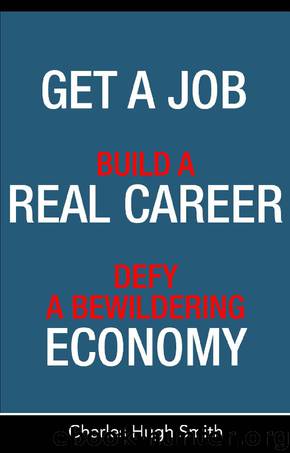Get a Job, Build a Real Career, and Defy a Bewildering Economy by Charles Hugh Smith

Author:Charles Hugh Smith [Smith, Charles Hugh]
Language: eng
Format: epub
Published: 2014-04-07T07:00:00+00:00
Investing in Ourselves
How do we acquire values and habits that manifest those values in our everyday lives? The key was described by Aristotle in ancient times: We are what we repeatedly do. Put another way: We are what we do every day. This explains the importance of habits, which are habits precisely because we do them every day or week, repeating the process again and again.
I am generally skeptical of the value of behavioral economics, as the primary insight (that humans are irrational and rationalize their mistakes/failures) doesn't differentiate between economic systems that function positively for most participants (i.e. low rates of corruption and inequality, high levels of liberty and transparency) and those which fail most participants. In other words, since all participants in both systems are prone to irrationality, how do beneficial systems arise? Behavioral economics is silent on systems, and that severely limits its utility in my view.
I also find little practical value in the insight that we overvalue ourselves when we succeed and rationalize our failures (we didn't have enough resources, etc.), as these irrationalities have been selected over time because they serve a positive function in maintaining our self-confidence.
The insight of behavioral economics that has a practical application is the awareness that our willpower/self-discipline is a limited resource which we must invest wisely. In this sense it is a form of scarce capital—what I call willpower capital. I liken it to a pool fed by a spring: when we exert our self-discipline, we drain the supply of willpower. Given time, the pool will replenish itself. But once we've drained our available self-discipline, tasks that require self-discipline become much more taxing.
When we invest our willpower capital in an organized fashion to developing new processes (habits), we are investing in ourselves.
We can distill the dynamics of changing our habits to express positive values into five points:
It requires a daily application of self-discipline to form a new habit or replace a destructive habit with a more positive one.
If we spend our available willpower on an array of projects rather than on developing one new habit, we are unlikely to be able to persevere long enough to cement that new habit to the point where it is part of our routine.
The earlier in the day we apply our self-discipline to forming a new habit, the more success we will have simply because our reserves of willpower are most abundant early in the day.
Setting goals is easy. What's difficult is developing a process to reach the goal, and making that process into a habit that becomes part of our routine.
Once a process becomes habit, we don't need to invest as much willpower capital in maintaining it.
Download
This site does not store any files on its server. We only index and link to content provided by other sites. Please contact the content providers to delete copyright contents if any and email us, we'll remove relevant links or contents immediately.
The Motivation Myth by Jeff Haden(5004)
Audition by Ryu Murakami(4616)
Adulting by Kelly Williams Brown(4235)
The Confidence Code by Katty Kay(4040)
Waiting in the Wings by Melissa Brayden(3124)
A Mind For Numbers: How to Excel at Math and Science (Even If You Flunked Algebra) by Barbara Oakley(3103)
Self-Esteem by Matthew McKay & Patrick Fanning(2953)
Nice Girls Don't Get the Corner Office by Lois P. Frankel(2934)
The ONE Thing by Gary Keller(2919)
Fooled by Randomness: The Hidden Role of Chance in Life and in the Markets by Nassim Nicholas Taleb(2861)
The Dictionary of Body Language by Joe Navarro(2829)
How to be More Interesting by Edward De Bono(2662)
Designing Your Life by Bill Burnett(2601)
Getting Things Done by David Allen(2587)
The Plant Paradox by Dr. Steven R. Gundry M.D(2427)
Police Exams Prep 2018-2019 by Kaplan Test Prep(2358)
What Color Is Your Parachute? 2015 by Richard N. Bolles(2213)
Dangerous Personalities by Joe Navarro(2176)
When to Jump by Mike Lewis(2049)
